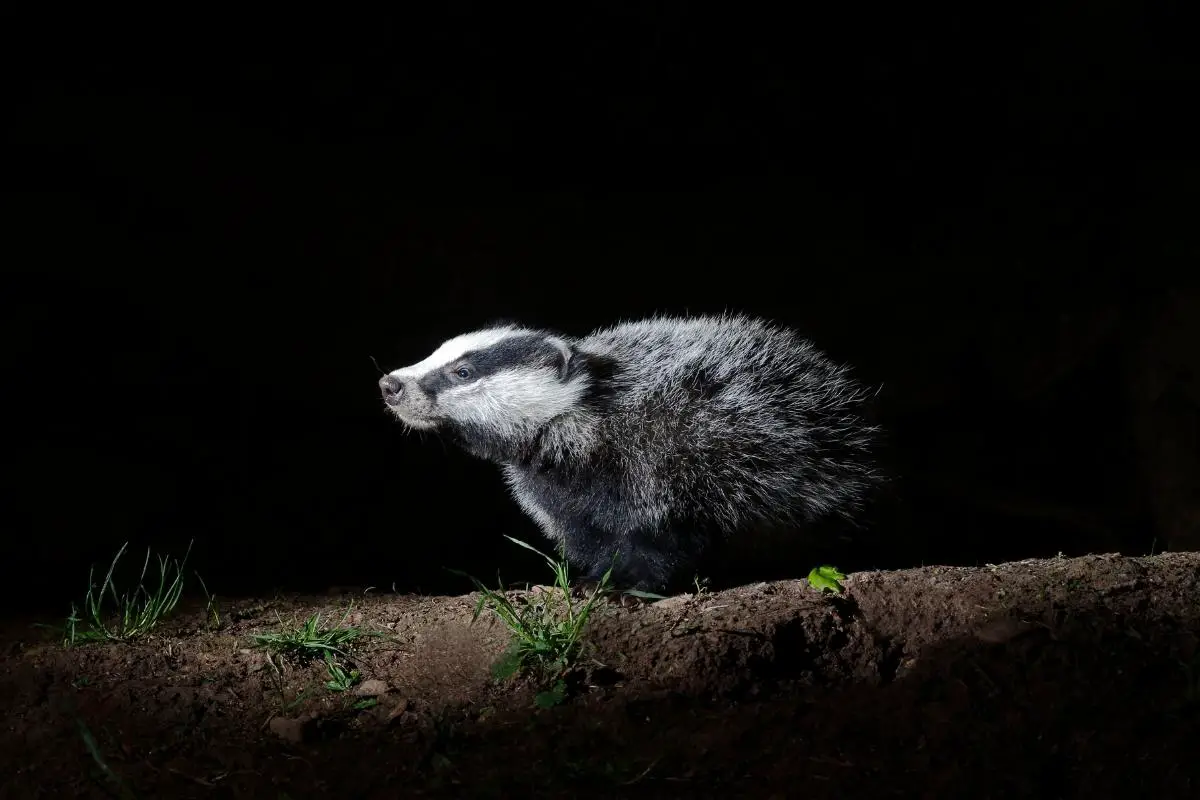Many animals in the wilderness can only be seen at night because they are nocturnal or crepuscular, and you might be surprised to hear that badgers can also fall into this category.
Are Badgers Nocturnal?
Badgers are nocturnal and are most active during night hours. They usually complete most of their activities at night, including hunting, digging, and scavenging. Badgers usually come out right around sunset and will stay out in the wilderness for up to twelve hours before retreating back to their den.
It is extremely rare to see a badger out during the daytime. You might get lucky and see them roaming around just before the sun sets over the horizon, but even this is extremely rare because badgers are considered to be nocturnal. Badgers are extremely difficult to see at night, which means you’re probably going to have better odds listening for them than actually seeing them.
Another factor is that they usually have sufficient tunnel systems underground that can help them move without being exposed to potential predators. If they are using these tunnel systems, it would be impossible to know that a badger could be nearby, especially during the darkest hours of the night.
Why Are Badgers Nocturnal?
Badgers happen to fall into the category of being nocturnal, but many people fail to understand some of the reasons why. This adaptation allows them to avoid some of the most dangerous predators. Many predators to badgers are not nocturnal, which means that a large percentage of them will be sleeping while badgers are awake during the nighttime hours.
Even though badgers are nocturnal, this doesn’t necessarily change their lifestyle in any meaningful way. They still hunt for food, build dens, and roam the wilderness as they would normally do. Badgers can use their senses to take advantage of the darkness and limit their ability to be seen.
Badgers have very poor eyesight, so they must rely on their other senses to take the lead. They do not like to come outside during bad weather and are slightly more active on nights that have bright moons. They spend a lot of time in their dens/setts, so darkness is familiar to them.
See our article for Badger Dens here.
Why Are Badgers So Adaptable?
One of the reasons that badgers are so adaptable is because they can use their senses to survive in the wilderness better than many other animals. They are very adaptable to their environment and can blend in with their surroundings. Badgers are capable of living in different types of environments, but they prefer the region of the ‘Great Plains’.
Badgers have been gifted with fairly sharp claws and very strong legs that help them get through their job duties in the wilderness. They are exceptional at digging and their color pattern allows them to use camouflage to their advantage. In the winter, badgers are less active. They only leave their den/sett for food. Source.
It isn’t surprising that badgers generally live a protective lifestyle. While they generally only hunt at night, they are usually busy underground during the daytime if they are not sleeping. The adaptable lifestyle that they are capable of living is imperative to their survival and it’s one of the reasons that badgers have stabilized their population numbers and manage to do pretty well in the wilderness.
Where Do Badgers Sleep?
Since badgers are nocturnal, this means they usually sleep during the daytime hours and come out to hunt at night. Most badgers have several dens within their territory with sophisticated tunnel systems inside. Badgers can usually take advantage of multiple entries and exit points to access these critical tunnel systems.
Badgers don’t generally make social contact with other badgers until the summertime when mating season starts. They prefer to remain solitary and live in their dens by themselves during most of the year. They will rarely leave their den during the daytime but it is possible in certain conditions. Many wild animals have been showing crepuscular behavior in recent years, going out in twilight hours and even in the daytime. Source.
Most badgers prefer to move several miles in a single day. Badgers need to use their abilities to their advantage so that they can find a safe place to sleep before going out to hunt for food at night. They are not afraid of climbing, digging, and hunting if it means that they may have a meal. They’ve also rarely been seen hunting in unison with other animals, including a coyote.
Why Would a Badger Be Out in the Day?
Working on different ranches in Texas, I have come across badgers during the daytime, crossing fencelines or old farm roads. Wild animals that push closer to human civilization tend to adjust their sleeping habits, becoming crepuscular.
Some people have suggested that a nocturnal animal seen in the day could be a sign of rabies or some other disease, but usually, this is not the case. A nocturnal animal like a badger being out in the daytime is more common than most think.
Final Thoughts
Now that you understand that badgers are nocturnal, it’s clear that many of their lifestyle activities take place during the darkness of the night. They are smart enough to understand that they need to use every aspect of their survival attributes to effectively survive in the wilderness. Being nocturnal is certainly one of those factors, but they will also use their digging and hunting abilities just as much.
- Hero Farm Dog Survives Epic Battle with Coyote Pack - December 9, 2024
- The 10-Minute Bedtime Routine That Changed My Dog’s Sleep Forever - November 29, 2024
- Creating a Safe Space for Nervous Pets: Your Guide to Pet-Friendly Havens - November 25, 2024

